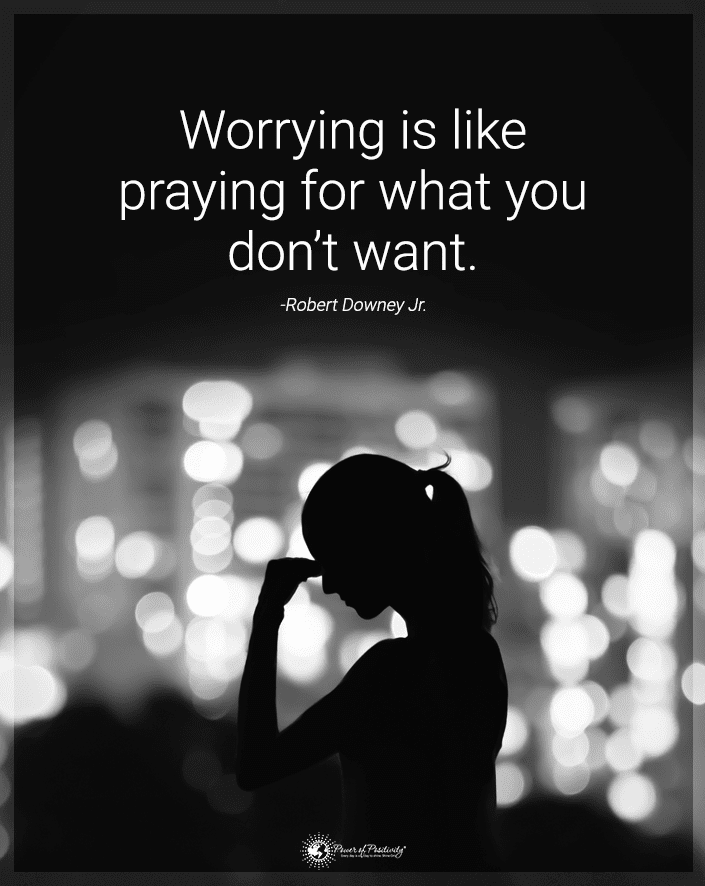In today’s society, there is so much to worry about. There’s an increase in violence, the global economy is in turmoil, we seem to be falling behind in educating our youth, and for many us, we are struggling just to put food on the table and keep our lights on. It’s no wonder we are a worrying society.
Have you ever noticed that some people tend to overthink more than others? They contemplate every decision for fear of making the wrong choice. And when they finally decide, they worry they made the wrong one.
Here’s why worrying is a sign of high creative intelligence
There is worry surrounding meeting our basic needs, and then there is worrying about the impact of every decision we make. Believe it or not, one is better than the other.
Worrying about the impact of every decision we make may be an indication of a high level of creative intelligence. It’s a sign of empathy, problem-solving and next-level thinking.
A recent study found a relationship between excessive worrying and creativity. Personality Neurobiology expert Dr. Adam Perkins says this about that relationship:
“It occurred to me that if you happen to have a preponderance of negatively hued self-generated thoughts, due to high levels of spontaneous activity in the parts of the medial prefrontal cortex that govern conscious perception of threat and you also have a tendency to switch to panic sooner than average people, due to possessing especially high reactivity in the basolateral nuclei of the amygdala, then that means you can experience intense negative emotions even when there’s no threat present. This could mean that for specific neural reasons, high scorers on neuroticism have a highly active imagination, which acts as a built-in threat generator.”
Basically, he’s saying if we are an excessive worrier; we are also more likely to be imaginative, creative, and an overall high-level thinker.
When looking at these findings, it makes perfect sense. Just think about it. Most entrepreneurs are solving a problem they or people they know are worrying about. Most innovators create products that solve a particular issue. And most artists use their worry and heartache to fuel their work.
Worry is what encourages forward motion and creativity. It’s the overthinking, the pondering, the wondering about something that generates theory and ideas. Think about it, if we were 100% content in our lives, what would there be to solve or fix?
Dr. Perkins also had this to say:
“Cheerful, happy-go-lucky people by definition do not brood about problems and so must be at a disadvantage when problem-solving compared to a more neurotic person. We have a useful sanity check for our theory because it is easy to observe that many geniuses seem to have a brooding, unhappy tendency that hints they are fairly high on the neuroticism spectrum. For example, think of the life stories of Isaac Newton, Charles Darwin, Vincent Van Gogh, Kurt Cobain, etc. Perhaps the link between creativity and neuroticism was summed up most succinctly of all by John Lennon when he said: ‘Genius is pain.’”
There is a lot of discussion around the power of positive thinking, but it seems there is also some power in what may be perceived as a negative thought.
Try thinking of negative thoughts as an alarm clock. It is waking us up to the fact that something is going on that needs our attention. It’s important to embrace our negative thoughts as warmly as we embrace the positive ones. We should question them, understand them, and use the information to make better decisions.
The problem with excessive worry, or any negative thought for that matter, is found when it consumes our every waking moment. We should begin to fear worrying when we allow it to keep us from connecting with the people in our lives that matter, taking action toward achieving our big goals, and being contributing members of our community.
When worry might be healthy
Using worry as a catalyst for change is healthy and encouraged. Using worry as a shield to avoid dealing with challenges can be detrimental to our mental health. Our job is to understand when our concern is fueling our creative intelligence and when it is standing in the way of us taking action toward personal growth. When we can understand the difference and use the information to choose our next step, we can truly begin to create the lives we were meant to live.
Final Words: The creative genius behind the worry…
There are creative geniuses among us. We should remember that the next time we are in the presence of someone who seems distracted and is brooding over the same problem as yesterday. He’s probably creating a solution to something we worried about at one time or another. And when he solves it, we will wish we had thought of it.
















